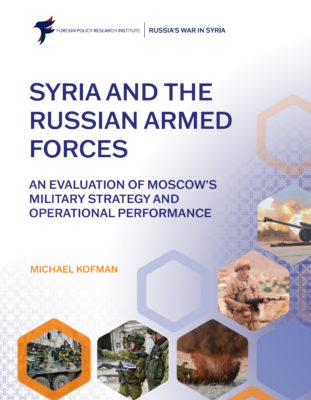
Introduction
The Russian Federation’s intervention in Syria has been a qualified success from the Kremlin’s perspective, and certainly from the Russian General Staff’s. The expeditionary operation has accomplished many of the initial objectives of the campaign and continues to serve the institutional interests of the Russian military. True, the war is not over, and Russia’s “victory” may yet prove a thorny crown to wear, as it has for countless other great powers who came to the Middle East in search of influence. However, Russia’s military operation merits examination, particularly because at the time of initiation, many had presumed the outcome would be a quagmire. Furthermore, the war in Syria has proven a crucible for evolution in Russian operational art, capability development, and strategy. It will influence an entire generation of military leadership.
A systemic examination of the intervention would seek to first establish what was known about the original Russian political goals, understanding that the ends sought may change over the course of a war, and the extent to which the military campaign was able to accomplish them. Did the Russian military strategy marry with the political ends, and were the ways and means visibly linked to supporting those objectives? This chapter seeks to understand how Moscow was able to achieve relative success in saving the Syrian regime, destroying the opposition, and aiding Assad in recapturing much of Syria’s population centers. This chapter also briefly reviews Russia’s road to war and its political objectives in Syria, then conducts an in-depth evaluation of Russia’s military performance in the Syrian War and the war’s impact on Russian military capabilities.
Continue reading the chapter here.
No comments:
Post a Comment